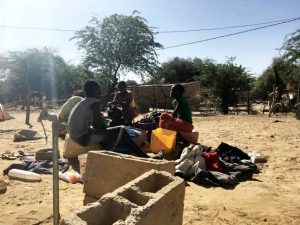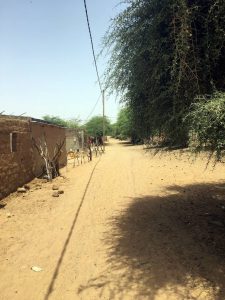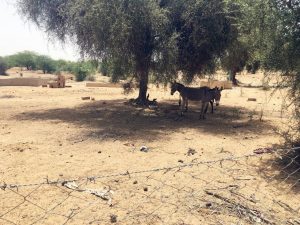This project is made possible through the partnership of WATER CHARITY and the NATIONAL PEACE CORPS ASSOCIATION. ![]()
 Location
Location
This project summary has been redacted for security reasons to omit the specific project location.
Xxxxx Xxxxxxx, Podor District, St. Louis Region, Senegal
Community Description
Xxxxx Xxxxxxx is a rural farming community located between a tributary to the Senegal River and the N2 highway. The village life is dictated by farming seasons and religious celebrations. The most remarkable characteristic of the community is the genuine kindness and warmth the inhabitants show to one another and their visitors.
The village consists of approximately 1,000 members and contains a health structure and various small businesses. Due to access to the newly built highway, the community has seen tremendous development in population, infrastructure, and commerce in the last 5 years.
To date, Water Charity has funded and completed two impactful projects within the village’s limits. The first was a latrine project for the elementary school, whose previous and dilapidated infrastructure could not handle the growth of students in the village.
The second project, completed with the help of the community and the PCV, established a central line of running water, passing through the heart of the village. Due to this collaboration between Water Charity and the community, there are now 3 public faucets, 15 private compounds with faucets, 2 new mosques in construction, and more village gardens established than ever before.
 Problem Addressed
Problem Addressed
The original pipeline project established a baseline for what is possible for many of the families in the village. Unfortunately, there are still a great number of families who lack access to the pipeline and therefore fresh and clean drinking water. This water has also been demonstrated as necessary for the establishment of home and community gardens. The majority of the compounds in the village are eager to build on the success of the original project and emulate its results by purchasing private faucets and establishing gardens.
Xxxxx Xxxxxxx is very fortunate to have a medium-sized women’s garden (15,000 m2) in the northeastern quarter of the village, which is protected by a previous Peace Corps fencing project. The garden contains three large concrete basins to hold water. The garden has been plagued in its development by a lack of access to water. The garden contains a relatively deep well that was once serviced by a manual pump. Once the pump fell into disrepair, 3 years prior, garden production sharply declined and has almost come to a standstill today. The women have found the pulling of water to be too laborious and time consuming to make garden production sustainable.
Lack of water access in homes and in community gardens creates barriers to sanitation, access to diverse and nutritious foods, and income-generating activities (such as vegetable sales and completion of new buildings).
Project Description
This project has two distinct aims: to extend running water to the highest density of homes without current access in the village and to expand the pipeline to the local women’s garden.
The new pipeline is designed to extend 126 m to the west, extending access to 11 more compounds. It will continue eastward 360 m, towards the women’s garden, offering access to 8 more compounds that currently lack access. Finally, the pipeline will expand 150 m to the north, servicing 5 more compounds. In total, the project requires 636 m of the pipeline to reach 24 compounds, averaging 8 inhabitants each.
This pipeline will also include three faucets at the terminus in the women’s garden, that will provide more than 100 women with water to garden effectively with.
The plumber and material supplier from the first project will again be used, bringing cost-effectiveness to this project.
The project’s start-up costs are relatively low, as the village has its contract established with the water service provider and the majority of necessary infrastructure in place.
 Project Impact
Project Impact
1,500 people will benefit from the project.
Peace Corps Volunteer Directing Project
C. Byrnes (This PCV previously completed the Agnam Tonguel Water System Project – Senegal,)
Monitoring and Maintenance
The monitoring and maintenance of this project fundamentally begins with a maintenance of the infrastructure. The water service has been actively monitored thus far and the only stoppage of water has been for one routine cleaning.
The faucets must be maintained by individual families, but as they become habituated to using them, we can expect families to have the intrinsic motivation to maintain their own individual sources.
The public faucets are maintained by the groups who pay their monthly bills (i.e. women’s garden faucets maintained by Women’s Group).
The monitoring of project results is the responsibility of the PCV. This includes, but is not limited to, keeping records of which families have purchased faucets and where, what home gardens have been started and their status, recording any profits from new enterprises started.
Let Girls Learn
This project contains apparent and subtle benefits to the women of the village. As in the prior pipeline project, school-aged girls will save time for attending school and studying after class, if they are freed from the routine labor of pulling water for their families to drink, cook, and bathe with.
Women are empowered by the access to their garden space, as all families have at least one female representative from their home who can cultivate a plot of land. Space, once functional and flourishing, can be used for girls’ education days, whether it be about female health or proper nutrition, as it will be regarded as a space of female empowerment throughout the village.
This project has been funded by an anonymous donor.